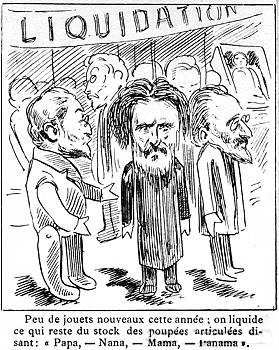Panama scandals

The Panama scandals (also known as the Panama Canal Scandal or Panama Affair) was a corruption affair that broke out in the French Third Republic in 1892, linked to the building of the Panama Canal. Close to a billion francs were lost when the government took bribes to keep quiet about the Panama Canal Company's financial troubles, in what is regarded as the largest monetary corruption scandal of the 19th century.[1]
The bankruptcy
On 4 February 1889, the Tribunal Civil de la Seine lawfully applied for the winding up of the Panama Canal Company in Paris. The work on the isthmus was stopped in the meantime. The lawfully ordered liquidator tried to maintain the work carried out, the buildings, the tools and the machinery. However, within a few years, high losses were incurred due to poor means of protection in the damp, warm climate. The French government pushed the completion of the liquidation further and further away, because the take-over offers of the various American companies seemed too small. An intermediate company was unable to be founded since the necessary capital failed. The liquidator appointed a commission to continue the canal project examination. The commissions report advised in 1890, the continuation of the sluice canal and the renewal of the contract with Colombia. The same year it succeeded in agreeing on a new contract in Bogotá, which was limited until 1904, on the same basis as the concession contract agreed on in 1878.
A concluding picture of the bankruptcy was first formed in 1892. Some 800,000 French people, including 15,000 single women, had signed for stocks, bonds and founder shares from the Panama Canal Company, to the sum of - the then considerable amount of - approximately 1.8 billion gold Francs. From the nine issues the Panama Canal Company received 1.2 billion gold Francs, 960 million gold Francs of which were invested in Panama.[1]
The scandal

In 1892/1893, a large number of ministers (including Clemenceau) were accused by French nationalists of taking bribes from Ferdinand de Lesseps in 1888, for the permit of the lottery issue, leading to a corruption process against Lesseps and his son Charles. Meanwhile, 510 members of parliament - including six ministers - were accused of receiving bribery from the Panama Canal Company to withhold from the public information about the company's financial status. Lesseps, his son Charles, members of the management as well as the engineer Gustave Eiffel, were at first given long jail sentences, although they were later annulled.
In the bribery trial, the former city development minister, Bethaut, received five years imprisonment, three of which he had to serve. Baron Reinach - the financial adviser of the Canal Company and exerciser of the various bribes – committed suicide. Other defendants fled to England. On 7 December 1894, Lesseps died.
Politicians accused of involvement included Léon Bourgeois and Alfred Joseph Naquet.[2] One hundred and four legislators were found to have been involved in the corruption, and Jean Jaurès was commissioned by the French parliament to conduct an enquiry into the matter, completed in 1893.[3] The investigations into the Panama affair were resumed in 1897, but the defendants were acquitted.
Aftermath
Georges Clemenceau was defeated in the 1893 election because of his association with Cornelius Herz. Although three governments collapsed, this crisis differed from the Boulanger affair in that the Republic was never really in threat of being overthrown. However, it did raise doubts in the public eye and meant that politicians were no longer trusted. To monarchists it proved that the republic was corrupt.[4]
Hannah Arendt argued that the affair had an immense importance in the development of French antisemitism, due to the involvement of two Jews of German origin, Jacques Reinach and Cornelius Herz. Although they were not among the bribed Parliament members (or on the company's board), they were in charge of distributing the bribe money among them. Reinach was working on the right wing of the bourgeois parties while Herz was working on the radicals. Reinach was a secret financial counselor for the government and handled its relations with the company. Herz was Reinach's contact in the radical wing, and his inside information enabled him to blackmail his boss, ultimately driving him to suicide.
However, before his death he had given the Libre Parole a list of the suborned members of Parliament in exchange for the paper covering up for him upon publication. The story brought Edouard Drumont's antisemitic daily a great deal of newfound popularity. The scandal showed, in Arendt's view, that the middlemen between the business sector and the state were almost exclusively Jews, thus helping to pave the road for the Dreyfus Affair.[5]
In 1894, a second French company, the Compagnie Nouvelle du Canal de Panama (New Panama Canal Company), was created to manage the assets, and potentially finish construction. The new company sought a buyer for the assets, with an asking price of US $109 million. The construction of the canal was taken over by the United States which bought out the lease, the shares and assets in the Hay–Bunau-Varilla Treaty of November 1903, for US $40 million. Work resumed in 1904 and the canal opened 3 August 1914.
References
- ^ a b Why de Lesseps failed to build the Panama Canal, THE PANAMA CANAL 1880-1914
- ^ THE PANAMA SCANDALS; An Exciting Scene in the French Chamber of Deputies. March 30, 1897, Wednesday [1]
- ^ On the Panama Scandal, speech by Jean Jaurès, 1893 (at Marxists.org Internet Archive)
- ^ [2]The Third Republic 1870–1914 by Stephen Tonge
- ^ Arendt, Hannah (1973-03-21). The Origins of Totalitarianism (New ed.). Harvest Books. p. 576. ISBN 0-15-670153-7.p. 95-99.
See also
- French political scandals
- Eric Zencey author of the novel Panama dealing with the Panama scandals
